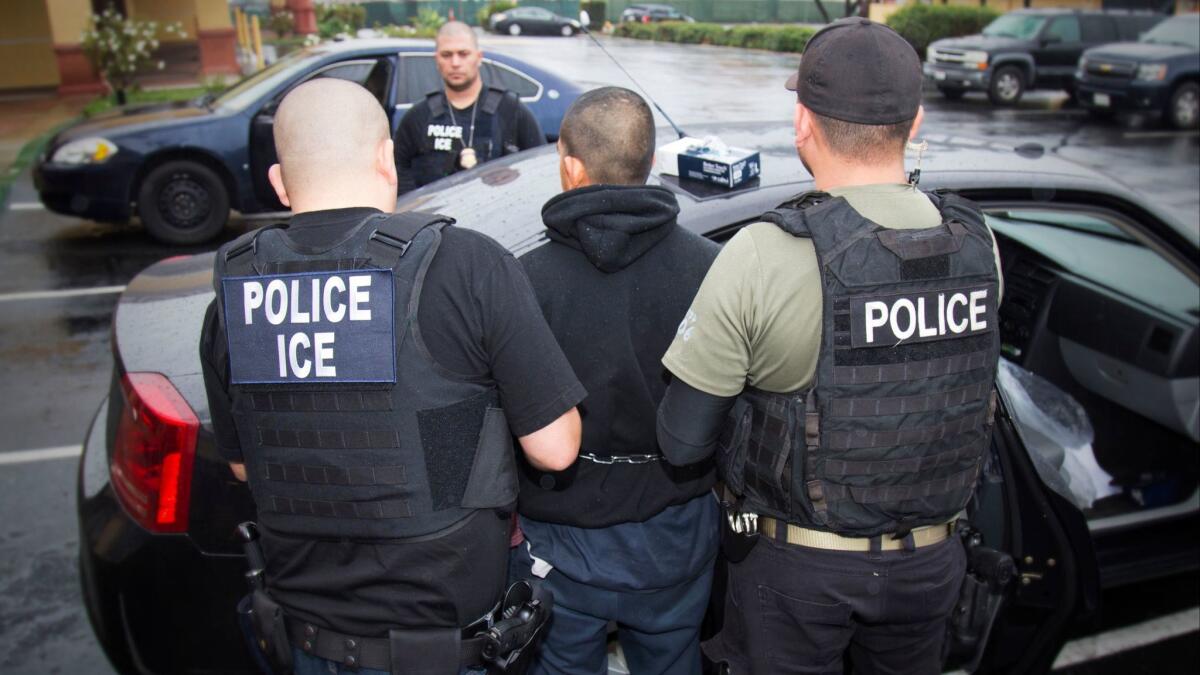Justice Department to ‘sanctuary cities’: Comply on immigration or you could lose federal grants

Reporting from Washington — The Trump administration fired an opening salvo in its promised crackdown on so-called sanctuary cities Friday, asking nine jurisdictions for proof that they are cooperating with immigration enforcement, and warning they are at risk of losing federal grants.
The Justice Department sent the letters to the California Board of State and Community Corrections, as well as officials in Cook County, Ill., Chicago, Las Vegas, Miami, Milwaukee, New Orleans, New York and Philadelphia.
More than 150 communities have laws or policies that restrict the ability of police and jails to hand over people who are in the country illegally to federal immigration officers, but the nine were chosen because they were named in a Justice Department review last year.
California officials reacted with defiance Friday, promising to double efforts to guard the state’s policies in the face of the implied threat to cut the funds.
“It has become abundantly clear” that Atty. Gen. Jeff Sessions and the Trump administration “are basing their law enforcement policies on principles of white supremacy — not American values,” Senate leader Kevin de León said in a statement.
“Their constant and systematic targeting of diverse cities and states goes beyond constitutional norms and will be challenged at every level,” he added.
California Atty. Gen. Xavier Becerra said the state will defend its policies against “fearmongering” by the Trump administration.
“Federal threats to take away resources from law enforcement or our people in an attempt to bully states and localities into carrying out the new administration’s unsound deportation plan are reckless and jeopardize public safety,” he said in a statement.
The emerging dispute between communities and the Trump administration is already in the courts, and the letters may bolster the administration’s case.
President Trump repeatedly vowed to cut all federal funds to sanctuary cities during last year’s campaign, but it’s highly doubtful Congress would permit that. Thus far the administration has only threatened to cut off grants administered by the Justice Department.
The actual amount at risk is relatively small — a total of $4.1 billion in federal grants to governments and law enforcement agencies across the country, and far less to the nine jurisdictions named Friday.
The California Board of State and Community Corrections, for example, received $20 million last year from the Justice Department program identified in the letter. The state then distributed the money to 32 counties and the state prison agency.
Los Angeles County received $3.59 million, the largest county grant, for a program that coordinates law enforcement, prosecution and treatment for illicit drug abuse and narcotics-related crime and gang culture. Los Angeles County Sheriff Jim McDonnell has opposed a so-called “sanctuary state” bill from De León that would limit cooperation with immigration officials.
De León on Friday also released a letter to U.S. Atty. Gen. Jeff Sessions written by a private attorney hired by the Legislature who said the state and its cities are in compliance with the law.
“It is our understanding that these [state] laws do not violate federal law and would not be subject to an enforcement action by the federal government,” wrote attorney Daniel Shallman.
Shallman’s law firm, Covington & Burling, has been hired by California legislators to assist the state in communicating with the Trump administration. The legal strategy is being guided by former U.S. Atty. Gen. Eric Holder.
Shallman asked that the federal officials confirm that they will not take action against the state to enforce a Trump executive order threatening to withhold money from sanctuary cities.
Officials in San Francisco County, which received $3 million last year for a program aimed at reducing recidivism for young people, have also said they will limit cooperation with federal immigration authorities.
Another $1 million from the federal grant program went to San Bernardino County to cover costs following the 2015 terrorist shooting that killed 14 people, and $396,310 went to a state prison program to reduce rapes of convicts.
The Justice Department warned that the grants could be jeopardized unless authorities can verify in writing that the state, counties and cities are not restricting sharing of information with federal immigration authorities on the citizenship status of people in prison and jail cells.
Trump and Sessions long have contended that sanctuary cities are defying federal law and are promoting crime by sheltering people who have violated immigration statutes, including gang members and other violent criminals.
Supporters of the sanctuary policies argue that immigrants here illegally would go underground and refuse to report crimes or cooperate with police if they feared doing so could lead to deportation.
In a statement, the Justice Department said many cities are “crumbling under the weight of illegal immigration and violent crime,” citing Chicago’s alarming murder rate and gang killings in New York City.
“And just several weeks ago in California’s Bay Area, after a raid captured 11 MS-13 members on charges including murder, extortion and drug trafficking, city officials seemed more concerned with reassuring illegal immigrants that the raid was unrelated to immigration than with warning other MS-13 members that they were next,” the release said.
The letters follow one of Trump’s executive orders, and a speech by Sessions at the White House in which he claimed that “countless Americans would be alive today — and countless loved ones would not be grieving today — if the policies of these sanctuary jurisdictions were ended.”
The nine jurisdictions were chosen because they were the focus of a study last year by the Justice Department’s inspector general.
They were among 155 cities, counties and jails that the Obama administration said were not fully cooperating with U.S. Immigration and Customs Enforcement, the agency responsible for identifying, detaining and deporting undocumented migrants.
Under President Obama, immigration officials tried a diplomatic approach to solve the dispute, sending Homeland Security Secretary Jeh Johnson to statehouses and city halls across the country to try to broker deals for some level of cooperation.
Obama administration officials didn’t press hard on the grants issue. Of places singled out by the inspector general’s report, only Connecticut has responded thus far — and it was not named on Friday.
The Trump team is taking a much blunter approach as Sessions rails about uncooperative jurisdictions at nearly every opportunity. Briefly, ICE had been putting out reports to shame uncooperative jurisdictions into complying, but the agency suspended them after they were riddled with errors.
Speaking in San Diego on Friday, Sessions mentioned the letters and repeated his charge that sanctuary policies are boons for hardcore criminals and gangs such as MS-13.
“Forcing local law enforcement to release criminal aliens only helps violent gangs and criminals,” he said. “Sanctuary jurisdictions put criminals back on your streets. They help these gangs to refill their ranks and put innocent life — including the lives of countless law-abiding immigrants — in danger by refusing to share vital information with federal law enforcement.
“I urge California to reconsider [its policies],” he said.
The letters, signed by Alan R. Hanson, an acting assistant attorney general in charge of the Office of Justice Programs, set a June 30 deadline for compliance, including “an official legal opinion from counsel. Failure, he wrote, “could result in the withholding of grant funds, suspension or termination of the grants … or other action, as appropriate.”
Tracie Cone, a spokeswoman for the California Board of State and Community Corrections, said the agency has received the letter and is reviewing it, but believes it is in compliance with the federal law cited by Hanson.
The initial letters may signal a more widespread crackdown on defiant, immigrant-rich cities like Los Angeles or Boston. Pushback already has begun: Seattle has filed a lawsuit asking a federal court to declare that it can refuse to help Trump’s ramped-up deportation campaign.
Other communities have signaled support for the crackdown.
In Florida’s Miami-Dade County, police and jails cooperate with ICE and only are pressing for reimbursement of costs to keep immigrants here illegally in jail, said Mike Hernandez, a county spokesman. The county received $6.5 million in police grants over the last two years, he said.
“There are some individuals who are undocumented and who have violent histories, and they should not be in our communities,” he said.
Twitter: @jtanfani
Twitter: @mcgreevy99
Tanfani reported from Washington and McGreevy reported from Sacramento.
ALSO
Trump wants to ramp up deportations, but ICE probably won’t be able to keep up
Kevin de León says Trump law enforcement policy based on ‘principles of white supremacy’
Feds say they didn’t deport ‘Dreamer,’ but acknowledge error on his DACA status
More to Read
Get the L.A. Times Politics newsletter
Deeply reported insights into legislation, politics and policy from Sacramento, Washington and beyond. In your inbox three times per week.
You may occasionally receive promotional content from the Los Angeles Times.












